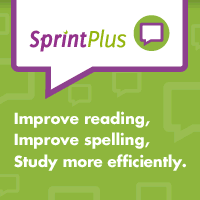To The Student Affected By Dyslexia
I am really pleased to have Deborah Jones, Associate Lecturer at Northumbria University contribute directly to the Study With Dyslexia Blog with this very interesting post about ways to learn.
To the student affected by dyslexia...
Learning can be a
battleground.
The pressures of
deadlines, troubles with concentration, issues with time and study management,
problems with sequencing and short term memory; even navigating a campus map
can be daunting. These problems are
often encountered by people with dyslexia, along with the literacy difficulties
with the automaticity of word recognition and spelling.
Research with dyslexic adults has shown that the brain has a
physical difference; there is a gap (or an inefficiency in processing) between
the Broca’s area (where we process hearing) and the Wernicke’s area (where we
process what we see). In a study by
Paulesu and Frith (1996), it was suggested that the bridge between these two
areas (the insula) works inefficiently in the brains of dyslexic adults. Thus, the auditory code is difficult to
translate to the visual code and back again.
This inefficiency can lead to problems with developing spelling and
writing skills, and the issues mentioned above.
One tried and tested method to help bridge this physical gap
is to use the multisensory approach to learning. If we seek to use all of our sensory
modalities, along with a significant amount of overlearning, there may be an
effective result. The technique of
synchronising auditory, visual and motor modalities has been developed as a
specific teaching strategy by many dyslexia specialists and is particularly
effective in the learning of irregular words using the MUSP spelling strategy
(Jenny Lee, 2002).
Think back to your
childhood. Is there a particular song
that takes you back? Do you remember the
sights, sounds and even smells at the time?
This is how the multisensory theory works. The more senses we include as stimulus for
the input, the more efficient the retrieval will be.
 |
| Get your 60 Day Demo Download Today. |
Practical research solutions for the student affected by
dyslexia include breaking reading into chunks, writing down a question you need
to answer before you research, reading the text aloud and making use of
skimming for specific information; use words in italics and sub headings to
guide you.
All Universities have a student support department who can
help with specific literacy issues such as dyslexia. A robust individual learning and support
programme should be agreed to ensure that the student experience is positive
and that the teaching strategies are appropriate to the individual’s needs.
Deborah Jones









That is condition where the child feels himself complex and cannot concentrate on studies but this site can help those with the unique teaching methods and can make them feel of the real situation.
ReplyDeleteA lot of students just cannot give their full attention to their studies because they are in some of the complex they feel at school due to their problem but for that they need to
ReplyDeletevisit this page and learn how to improve their problem.
They need our commitment and attention because everyone is seeing at them from a different mind set and they need care from us so https://www.phdproposal.com/about-us/ can help us to understand what they actually demand from us.
ReplyDeleteA great deal of individuals only are not able to supply his or her entire care about his or her reports as they are throughout many of the sophisticated that they experience in institution this can trouble except for that they need to pay a visit to this page https://www.nursingcapstone.net/how-to-write-a-capstone-paper/ along with figure out how to boost his or her trouble.
ReplyDeleteA lot of people just aren't able to provide his / her whole worry about his / her reviews because they tend to be all through most of the advanced they encounter within organization this could difficulty aside from that they must visit this site https://www.nursingpersonalstatement.com/check-our-newly-qualified-nurse-personal-statement-examples/ together with learn how to increase his / her difficulty.
ReplyDelete